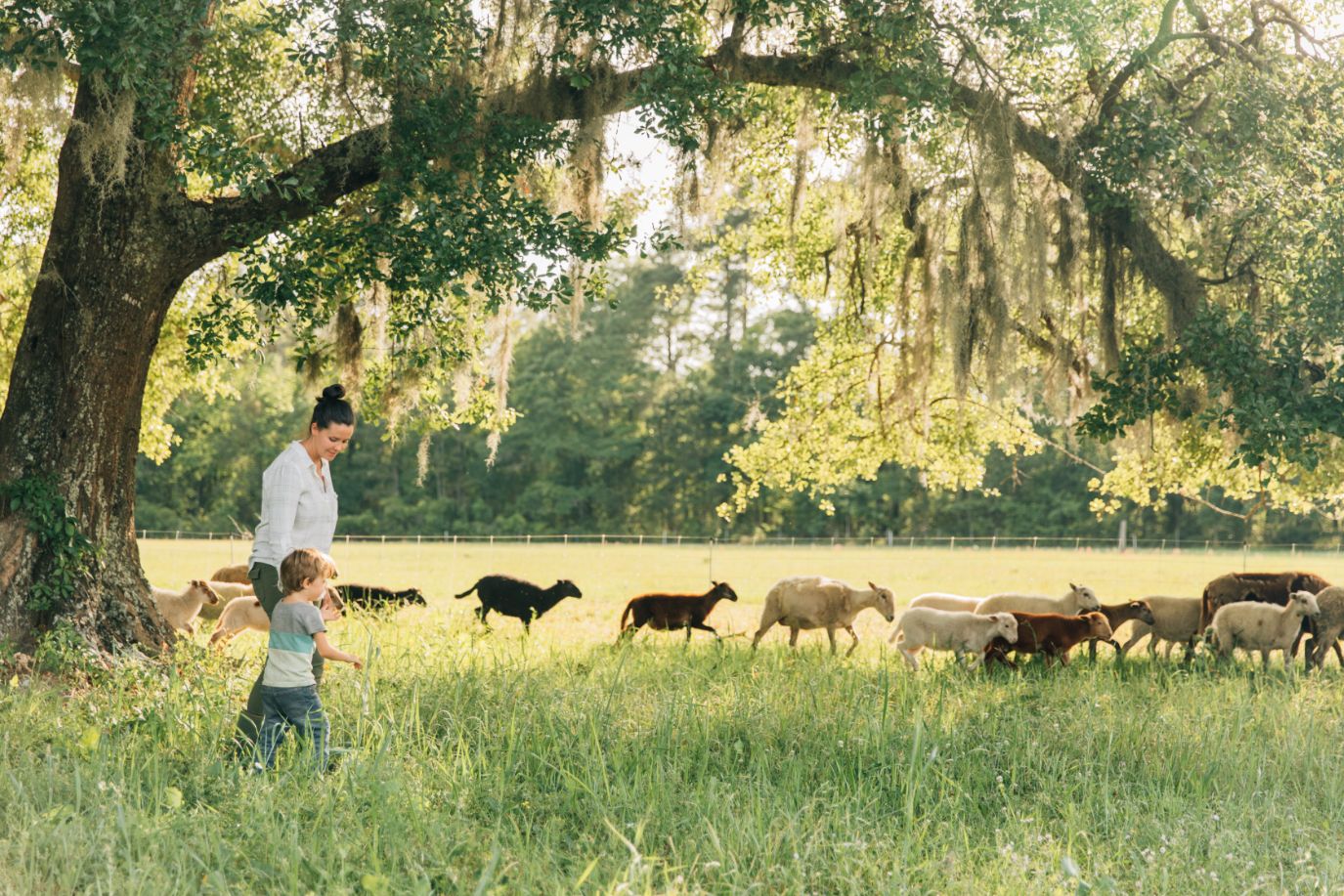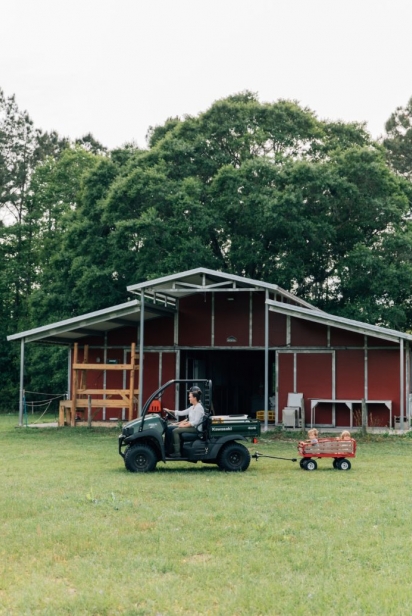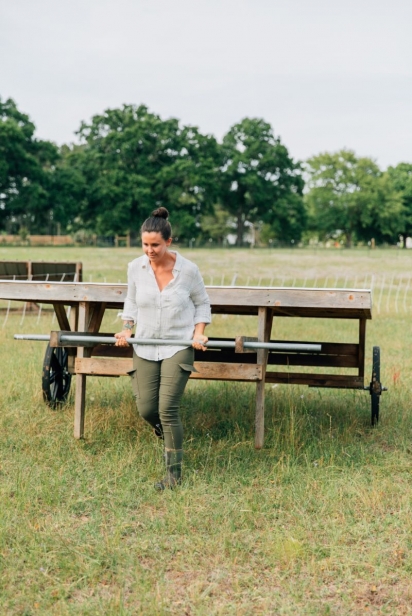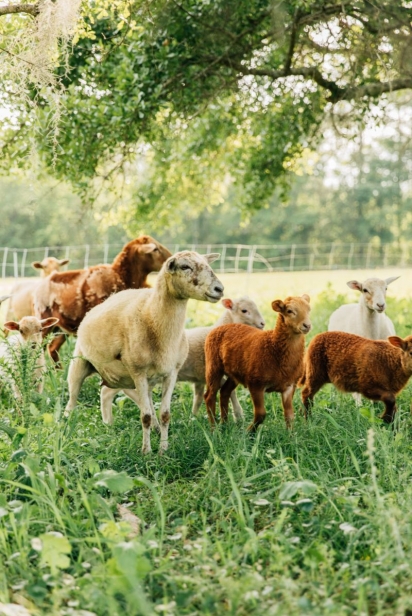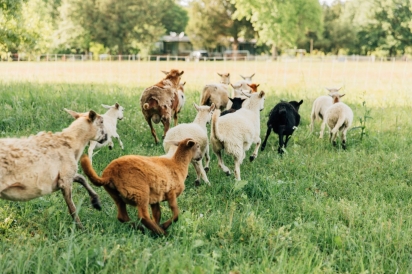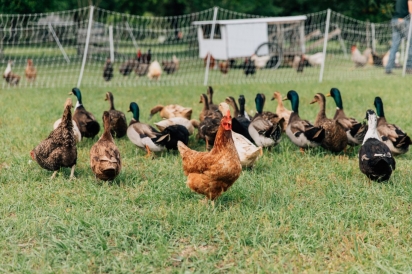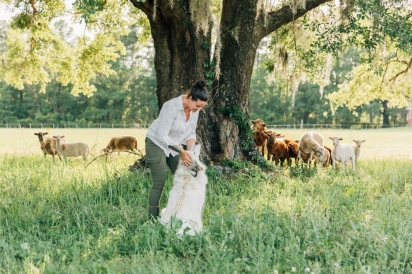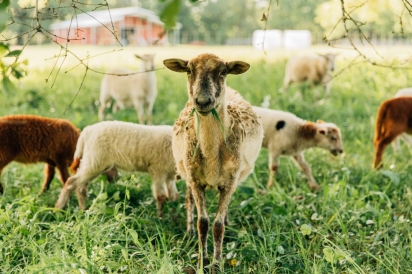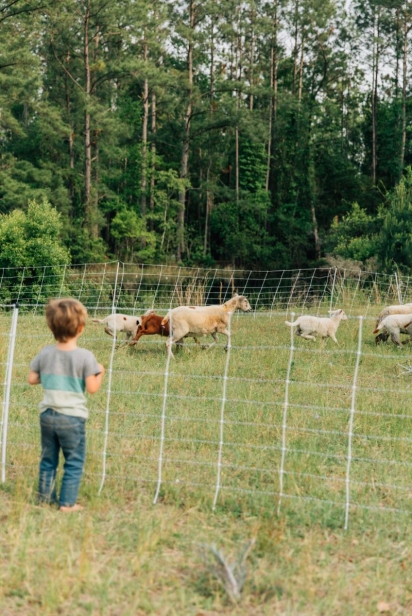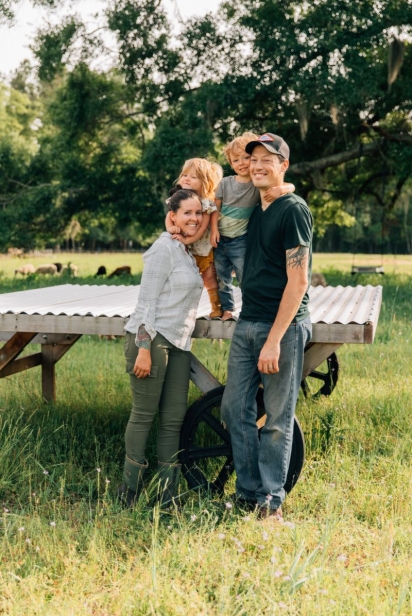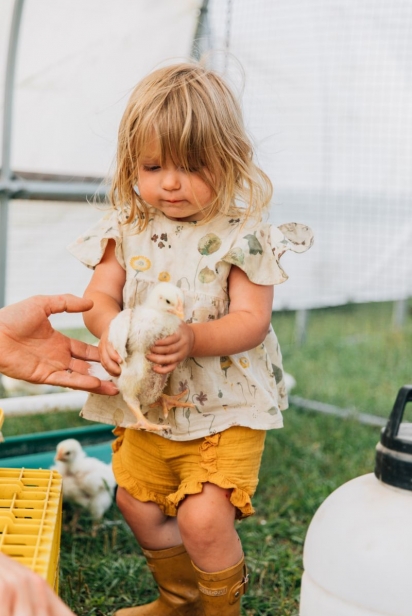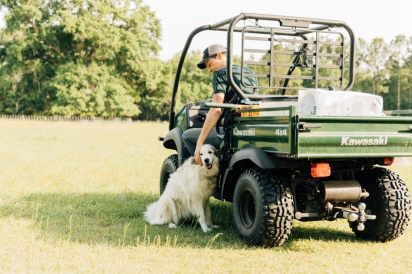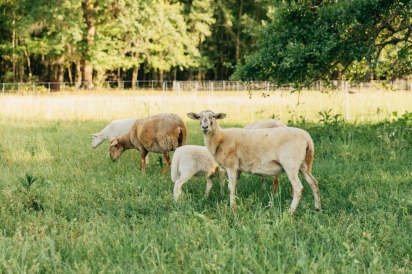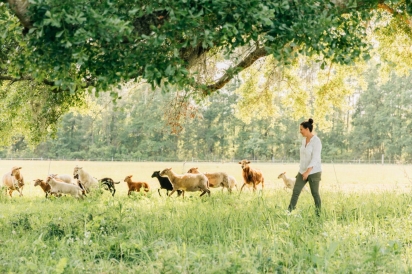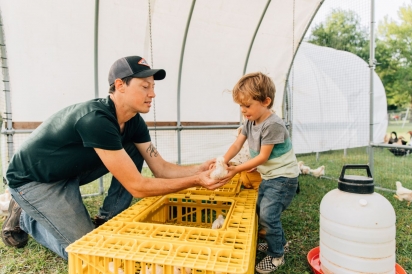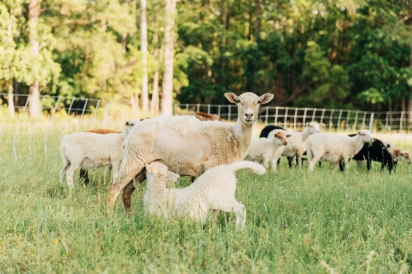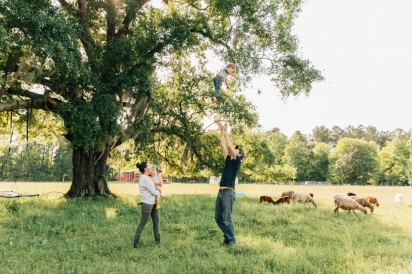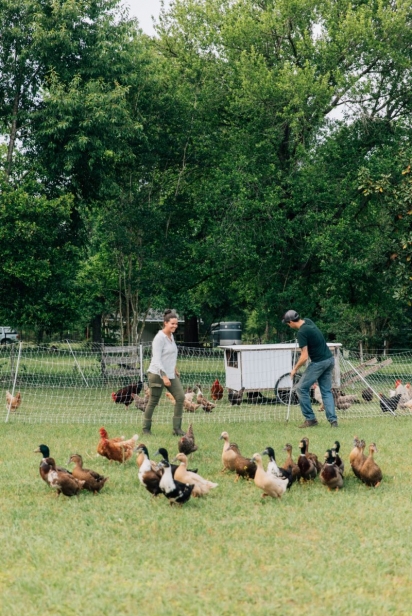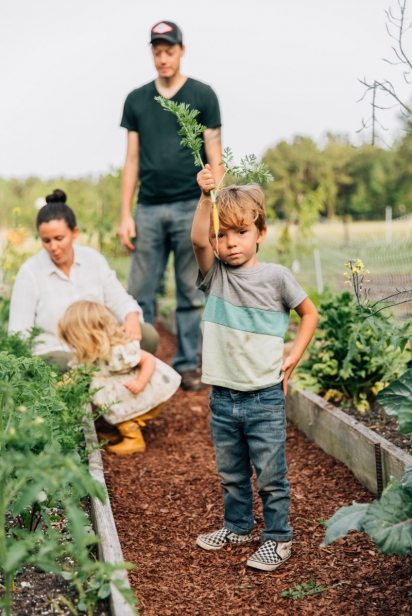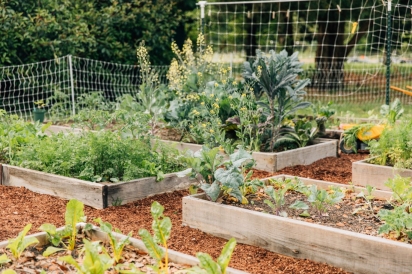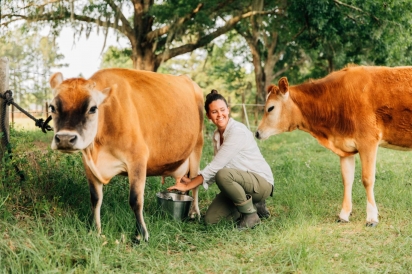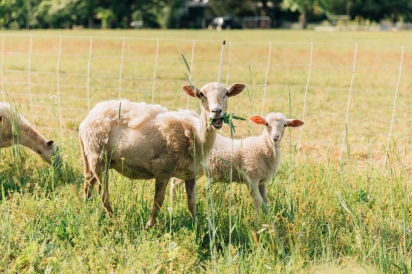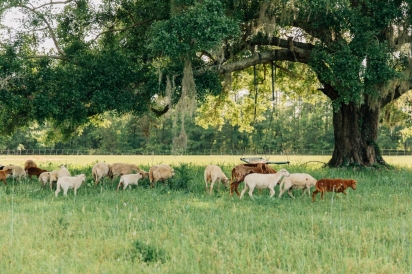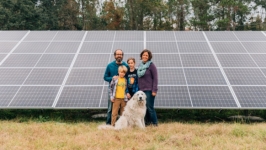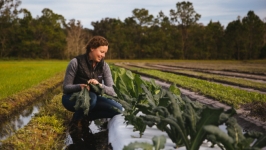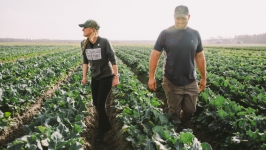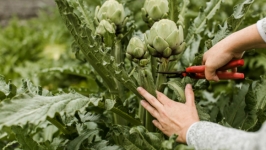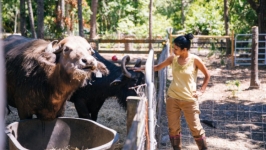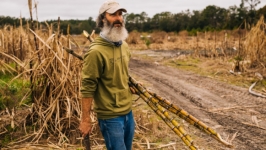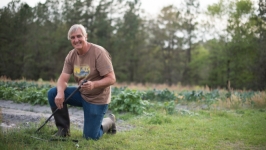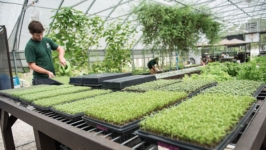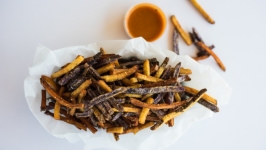Raising Sheep in NE Florida
It’s a few hours before sunset but Five Cedars Farm in Hilliard, Florida is still alive with the sights and sounds of animals basking in the final moments of daylight. Ducks quack. Hens cluck and peck at the earth. From their pasture, dairy cows chew their cud, watching all with their big brown moon eyes. Gloucestershire Old Spot pigs root and forage the dense forest on the property. Across the farm on a smaller pasture, a flock of sheep graze as their new lambs frolic in the vernal twilight.
The sheep are but the latest piece in the interconnected puzzle of regenerative agriculture being practiced on Five Cedars Farm by Murphy and Josh DeBerry, a couple whose journey towards holistic farming began ten years ago with the decision to reexamine their dietary choices. “People have strayed so far from their food,” Murphy says. “Most don’t know or even question where it comes from.”
The sheep at Five Cedars are Katahdins, a breed that produces hair instead of wool and is therefore more capable of thriving in the Florida climate. They’re also remarkably parasite-resistant, making them an ideal choice for an organically-minded farm insistent on producing antibiotic-free meat the natural way. “When we’re buying animals for breeding, we look for ones that will do well on this system,” says Murphy. “We’ve never given any of our animals any vaccines, antibiotics, growth hormones or dewormers. We don’t want to eat that.”
Achieving this requires significantly more work and attention than their factory-farmed counterparts. The sheep are moved to new paddocks multiple times a day to maintain the integrity of the soil and disrupt the parasite cycle, keeping both the land and the animals as healthy as possible. It’s a delicate balance, and a labor of love. The DeBerrys are new to this, but they’re learning every day, patiently growing their flock with care and intention.
Further south in Melrose, Florida, Jim and Amy Warmke raise sheep and chickens on a narrow 20-acre tract they call A3 Farms, short for Adventures in Alternative Agriculture. Although a third generation farmer, Jim is a computer programmer by day who considers sheep farming “a hobby gone out of control.” As he shows me around their small but efficient operation, he explains how, when he got back into the farm life after escaping the city, he had to learn everything all over again. “I suffered from the delusion that I knew something about raising sheep,” he jests. “Thankfully most survived.” Some of it he learned from experience, the rest he gleaned from other farmers, in particular those involved with the Meat Sheep Alliance of Florida.
“Right now lambing season is just over and we haven’t weaned yet so we’ve got the lambs and the breeding ewes [female sheep] in here,” Jim tells me with satisfaction as we drive past a pasture full of ewes and young lambs still greedily snatching for their mothers’ milk. “We had three sets of triplets this year,” he adds.
Larger in number than the Five Cedars flock, the A3 sheep (also Katahdin) are the product of over 15 years of selective breeding. There are currently around 20 to 30 ewes on the farm, plus their most recent litter. Two giant rams graze a separate pasture and are only introduced to the larger flock during mating season. Every few years A3 swaps rams with other breeders to maintain genetic diversity and prevent inbreeding.
After weaning, the lambs enjoy a grass-only diet. “We let them get to harvest weight more slowly because we don’t do grain and all of that,” Jim says. The fastest-growing males will be harvested in the early fall while the slower-growing females ensure the meat supply lasts nearly all year long.
Grass-fed Katahdin lamb yields a sweeter, milder flavor than what consumers may be accustomed to with grain-fed or wool-producing sheep. According to Jim, the lanolin in sheep’s wool is responsible for the intense gaminess often associated with lamb meat. Grass-fed lamb is also leaner, higher in protein and richer in omega-3 fatty acids and a compound called conjugated linoleic acid, which is known to possess anti-cancer properties and potentially prevent obesity.
I ask Jim how he likes to cook his lamb after he blesses me with a few cuts from the freezer. He suggests making burgers out of ground meat and going low and slow with the roast cuts. “It absorbs spices and flavors really well,” he says. Later, I settle on a recipe for a Yemeni stew called maraq with lots of paprika, cumin, cardamom and a touch of cinnamon.
The DeBerrys harvested their first lamb, a ram, this past fall. Present were the DeBerry children, both under four, who have spent their entire young lives on the farm. “They’re learning from a very early age that this is where your food comes from,” says Murphy. Still, it was an emotional experience for the family, especially for Murphy. “I work with these lambs multiple times a day, every day,” she says. “I’m very attached to them.”
Yet who but the farmer herself is capable of fully appreciating the fruits of her labor? “He was incredible,” Murphy beams when I ask how it tasted. “It was probably the best meat we’ve ever had.”


